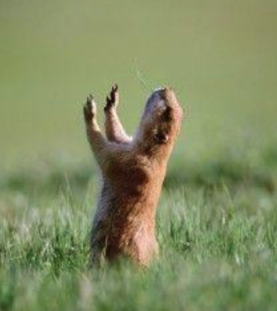Every Sunday, I join a small group of Santa Feans to feed prairie dogs who live, as most now do, crammed in a triangular wedge of dry dusty land between highways. Once prevalent throughout New Mexico, the Gunnison and Black-tailed prairie dog is an icon of this state. Sadly, its reputation as “varmint” has led to it being displaced by growth, its burrow-based living space often bulldozed over for new development, or whole communities shot for sport. Prairie dogs are a keystone species, which means they are a living vital intersection of prey and predator. The burrows and colonies they create protect over 100 other species, they are communal beings who take care of one another even if it means death, and they often greet the sunrise or sunset as if in prayer or ritual.
Recently, one of my colleagues was distributing grains that I topped off with carrots for hydration, and we were admiring all the new burrows and wee ones, delightfully squeaking as we dropped food in. I was sharing how someone had laughed at me for doing this, and said “What a waste of time—it isn’t sustainable” to which I asked: “Name one thing that humans do that is truly sustainable?” Of course, in communities and geographies where people still live in a non-extractive, reciprocal alliance with the earth and all her creatures—rooted, 2 and 4 legged, winged, finned, crawling and slithering – there are most likely many sustainable actions regularly committed by those intentional stewards of the land. Sadly, feeding these darling and essential members of the web of life is not sustainable and I do it because they have been disrespected and cruelly subjected to loss of place and home by humans. As a human, I know I bear the responsibility of yielding equal amounts of respect with the powers I have to create and to destroy. The least I can do is contribute to their decreased suffering by offering food. As my colleague said amidst this discussion: “Prairie dogs are a big part of what makes New Mexico, New Mexico. They are this land. Their existence here is why we are New Mexico.”
New Mexico has a reputation as unique as these animals. We are often referred to as a “Third World Country”. Aside from the derogatory nature of that now passé term, we are a bit like emergent nations that follow a different flow than others. Having worked in international development and humanitarian response for over 30 years, I recognize the myopic tone of that term which really means countries that have a different way of governance or less emphasis on extraction-based, capitalist economic development. Colonization has an impact here: Inherent in that idea is the belief that development matches a certain socio-economic and socio-political standard suited to the colonizers. The loss of habitat, food, freedom and life for prairie dogs and so many species – including humans – is a direct consequence of how fast colonization changed the landscape and access to More-than-Human, Indigenous and traditional ways of being.
On June 7 of this year I saw the movie, First We Bombed New Mexico. This was an auspicious day to see it as it was the day that the S.3853 bill (Radiation Exposure Compensation Act, or RECA) sunset. The film’s courageous director and many of the individuals featured in it were present in the audience. After seeing Oppenheimer receive seven Academy Awards — despite its failure to acknowledge the land stolen from the Tewa to build Los Alamos or the extremely high rates of cancer in Brown and Indigenous communities downwind of the Trinity A-bomb test site — I am convinced that every American should watch First We Bombed New Mexico. The sunsetting of the bill means no reparations for these communities, who continue to endure the loss of loved ones and compromised health, having survived at least two waves of colonization. Meanwhile, predominantly white communities in Arizona, Utah, and Nevada received reparations for the Nevada test site exposures in the 1950s. The injustice is glaring.
Displacement is being forced off one’s ancestral or homelands or being unable to live there as fully and healthfully as one once could. Displacement is the act of separating home from habitant, which is cruel. This human practice of displacement of beings, human and More-than-Human, who are not just living there but who are the place, connected to the land and soil and sky in ways that may be invisible to some, is not sustainable The absence of economic “profit” of a particular kind does not mean that the potent and very real depth of life’s reciprocal relationship between earth and those who live with her is not valuable. The webs that connect us are not the greedy webs of capitalistic entrapment and carnage; nor are they the technological webs that make virtual communing possible. Yes, technology can connect us in powerful and meaningful ways, but this is not the web of palpable love of flesh to flesh connection. This earth-body/flesh-body reciprocity is our most valuable treasure because it is the weaver of the web that sustainably includes us all in love and respect.
